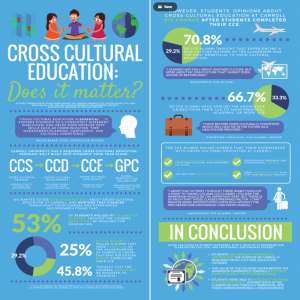Week 1 – Reciprocal Learning across cultures: Conflicts of Civilizations or Dialogues Across Cultures?
Globalization in Education and Global Competences and Intercultural Competences (Session 1A)
As the preparation for the sessions that follow, Part One will help you understand the contexts of the current education landscape. This week, you will develop a basic understanding of globalization in education, and broaden your knowledge of current educational contexts between West and East through which you are encouraged to delve in two different perspectives surrounding civilizations.
Read the articles in response to this week’s questions critically by reflecting on your own learning or teaching experience. We provide additional resources for those of you interested in expanding your knowledge of the Chinese language and culture and/or of the English language and Canadian culture.
Readings
Assignments
Infographic Reading Summary or Reflective Summary
You can choose either summarize your reading visually and creatively on one page (e.g., infographic, see the sample below) or write a reflective summary in 2-3 pages (12 Times New Roman, Double Space) based on the provided readings and/or learning resources.

The picture above explains Cross Cultural Education with statistical analysis. It has a license of CC-BY-NC-ND.
Questions to Consider This Week
- To what extent do you agree or disagree with Huntington’s (2000) “clash of civilization”? Is it imperative in building dialogues among different civilizations?
- To what extent do you agree or disagree with Hayhoe and Li’s (2008) statement that “the West can learn from the educational ideas of East societies?” (p. 30)
Resources for West – East Reciprocal Learning
- In 2006, the United Nations and International Bureau of Education created policy documents to ensure access and quality education for all learners.
- Michael Szonyi – Modern China: A Village Histroy
- Important organizations: Centre for International Policy Studies and Asia Society.
Language and Culture Learning Materials (English/Chinese)
For non-Chinese native speakers:
- Amazing China-Perpetually White Mountains
- Amazing China-Four Sisters Await for Adventurers
- Amazing China-Lakes with Amazing Colours
For non-English native speakers:
- 50 Things that Prove Canada is a Unique Country

